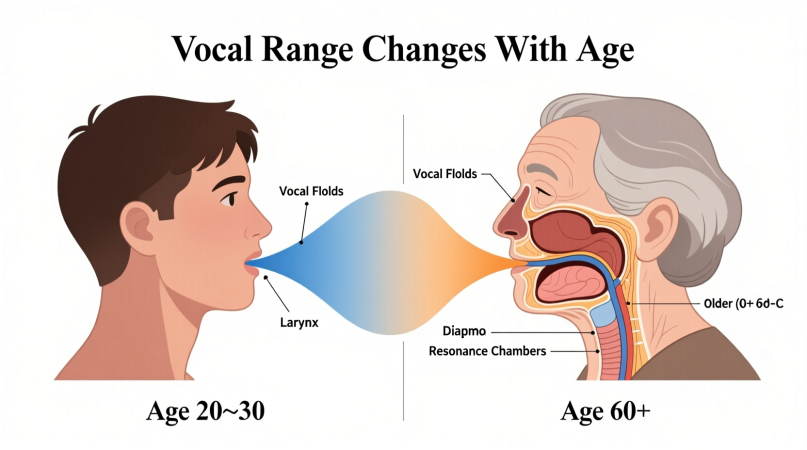
Every singer—whether a beginner or professional—wonders how their voice may change over time. The vocal range, which represents the span between the lowest and highest notes a person can sing, is not fixed. It evolves as the body grows, matures, and ages. This natural shift is influenced by biology, vocal habits, and overall health.
If you’re curious about your current abilities, it’s a good idea to try a vocal range test online to identify where your voice stands right now.
Why Vocal Range Shifts With Age
Several factors influence why and how a singer’s range changes:
- Physical growth: During puberty, especially for male singers, the larynx grows and causes dramatic changes in vocal tone and range.
- Hormonal influence: Hormonal fluctuations—such as menopause—can thicken or dry the vocal folds.
- Muscle elasticity: Just like any muscle, vocal cords lose some flexibility with age.
- Lifestyle choices: Hydration, diet, smoking, and vocal care all affect how the voice ages.
Male vs. Female Vocal Range Changes
- Male singers often experience deepening voices in their teenage years. With age, some higher notes may become harder to reach, though low notes often remain rich. Learn more about specific ranges like the baritone vocal range explained here.
- Female singers can lose some brightness in their upper register as they age. However, techniques and proper training can help maintain flexibility well into later years. Curious where your voice type fits? Explore details in the soprano range guide.
Can Training Preserve or Expand Range?
The good news is that consistent vocal training can help preserve and sometimes even expand your range at any age. Some effective practices include:
- Warm-ups and scales to keep vocal cords flexible.
- Breath control exercises to support sustained notes.
- Hydration and vocal rest to avoid unnecessary strain.
- Working with a coach who can spot unhealthy habits.
For a more precise evaluation, you might try using a vocal range calculator tool. It helps measure your exact span in a structured way.
Famous Examples of Range Evolution
- Whitney Houston maintained her powerful belting voice for decades, though her later years reflected some reduced clarity.
- Paul McCartney shifted from high youthful notes to a warmer, mature tone.
- Mariah Carey still accesses her whistle register but uses it sparingly compared to earlier albums.
These examples show that while changes are natural, technique and care can help singers stay strong for decades.
Tips to Maintain Your Range Over Time
- Stay hydrated—dry vocal cords lose flexibility.
- Avoid smoking or excessive alcohol.
- Rest your voice after heavy singing.
- Keep up with daily vocal exercises.
- Track your range regularly using an online tool.
FAQs About Aging and Vocal Range
1. Does everyone lose their high notes with age?
Not always. Many singers keep high notes with proper training and vocal care.
2. Do men’s voices always get deeper?
Typically yes, during puberty. After that, aging may cause a loss of higher notes, but not always significant deepening.
3. Can you increase vocal range after 40?
Yes, with consistent exercises and healthy habits, you can maintain and sometimes expand your range.
4. Why does my voice feel tired more easily as I age?
Aging vocal folds may lose elasticity. Hydration and vocal rest become more important.
5. Should older singers still train daily?
Absolutely. Gentle, consistent training keeps the voice active and prevents loss of flexibility.
